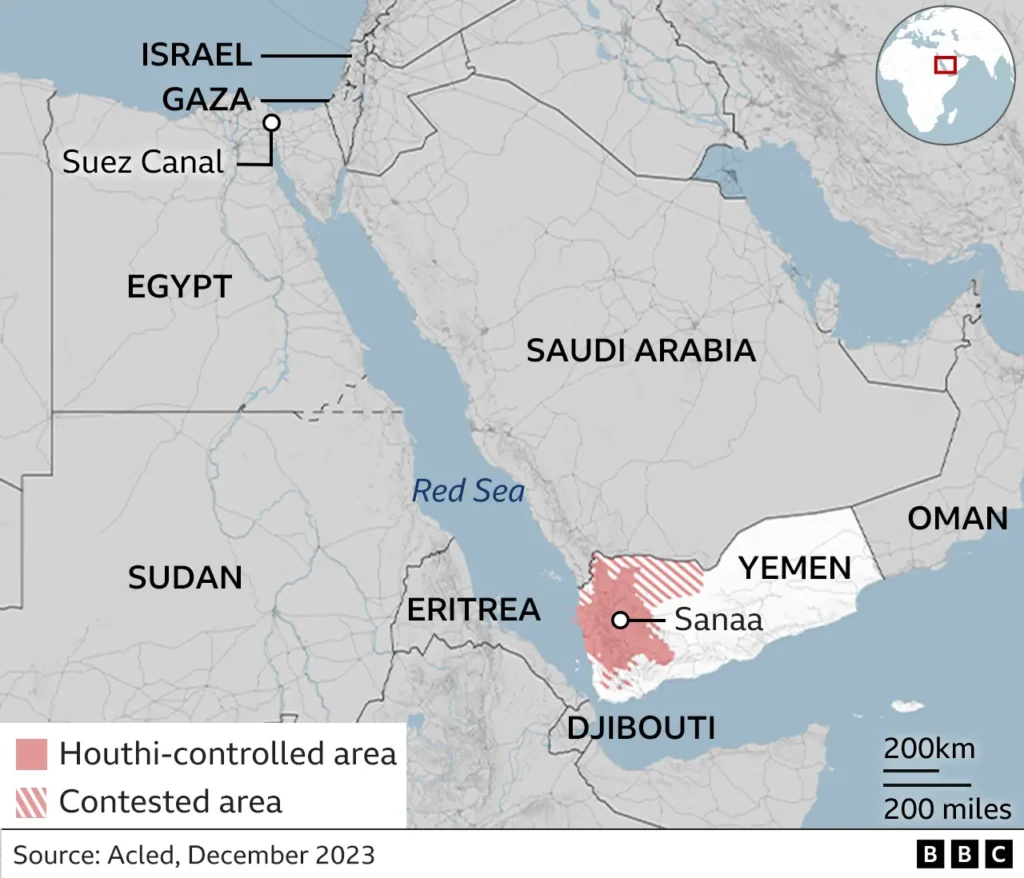US And UK Launch Fresh Strikes on Houthis in Yemen Notching Up The prospect of Regional Conflict
By Paul Knaggs
The Pentagon said Monday’s strikes hit eight targets, including an underground storage site and Houthi missile and surveillance capability.
The US and UK said they were trying to protect the “free flow of commerce”.
A joint statement issued by the Pentagon confirmed “an additional round of proportionate and necessary strikes” against the Houthis.
The statement added: “Our aim remains to de-escalate tensions and restore stability in the Red Sea, but let us reiterate our warning to Houthi leadership: we will not hesitate to defend lives and the free flow of commerce in one of the world’s most critical waterways in the face of continued threats.”
The latest US-UK joint airstrikes mark the eighth American attack on Houthi targets in Yemen and the second coordinated operation between the allies. US jets from the aircraft carrier USS Eisenhower joined four British Typhoon fighters in the bombing runs.
The UK Ministry of Defence insists “rigorous analysis” was conducted to minimize civilian casualties. However, the continued escalation despite little evidence of deterring Houthi attacks on shipping raises doubts.

Since the initial coordinated strikes on January 11th, the defiant Houthis continue targeting vessels in the Red Sea. Their goal appears to galvanise anti-Western sentiment at home and across the Arab world by portraying themselves as champions against Israel and imperialism. While Iran and other Middle Eastern nations see only Western imperialism and gunboat diplomacy brought about by the United States and its poodle partner Britain in these escalating raids.
To countries sceptical of American and British motives, the bombing campaigns smack of a return to destructive old habits of arbitrary interference in the region. Rather than protecting collective interests, the airstrikes appear a brazen exertion of waning Western hegemony to Iran and Arab populations. This perception, inaccurate or not, adds further fuel to the view of the US and UK as self-interested powers whose actions sow chaos, not order.
Despite any intentions that may underpin the strikes, aimed at safeguarding international shipping. The history of Western military meddling in the Middle East casts its long shadow. The legacy of mistrust lingers. As such, the latest show of naval and air power risks playing into Iranian and Houthi narratives of righteous resistance against neo-imperialist aggression. Perception matters, especially when trying to break spirals of violence instead of repeating them.
So far, it is claimed Western raids have taken out Houthi launch sites and degraded at least 30% of their missile stockpile according to intelligence estimates. But the recent UK-US announcement of Operation Poseidon Archer signals an ongoing bombing campaign, not a one-off retaliation.
As the allies vow “defending mariners from illegal and unjustifiable attacks,” their own strikes look increasingly open-ended. With the Houthis’ capabilities damaged but their zeal unabated, the impact on shipping threats remains uncertain despite the mounting risks.
Rather than restoring deterrence, the US and UK risk entrenching a cycle of attack and counter-attack. Their show of force may play well domestically but boomerang strategically. With peace in Yemen more distant than ever, and with the ongoing massacre in Gaza leaders must reflect carefully on how bombing serves stability or humanity.

In the ominous shadows of geopolitical unrest, an escalated conflict could unleash catastrophic economic repercussions, casting a dark pall over the global stage. The Red Sea, a vital artery in the intricate network of global supply chains for energy and goods, teeters on the precipice of turmoil. This strategic waterway, flanked by the tumultuous realms of Yemen and Saudi Arabia to the east and Eritrea, Sudan, and Egypt to the west, is an economic linchpin.
This geopolitical tinderbox converges at the Sinai Peninsula, where the Red Sea pours into the Suez Canal—an artery that knits Europe and Asia through the shortest sea route. However, this maritime thoroughfare, whose vulnerability was starkly exposed in 2021 when a ship ensnared its expanse, triggering worldwide aftershocks, now faces an even graver menace.
A looming spectre haunts the canal, compelling shipping firms to veer towards a costlier and time-intensive circumnavigation of Africa. Drones and missiles, ominous agents of destruction, lurk in the shadows, posing a severe menace to vessels and their crews. Faced with this menacing panorama, shipping companies have mandated their captains to navigate the treacherous waters via the elongated route—a desperate measure to safeguard against potential havoc.
As the economic tremors reverberate across nations, the world awaits the impending storm, and it is growing…
This latest escalation comes after US President Joe Biden and UK Prime Minister Rishi Sunak spoke earlier on Monday.
In an official readout of their phone call, the White House said Mr Biden and Mr Sunak “discussed ongoing Iranian-backed Houthi attacks against merchant and naval vessels transiting the Red Sea”.
They reiterated “their commitment to freedom of navigation, international commerce, and defending mariners from illegal and unjustifiable attacks”, the White House said.
It added: “The president and prime minister discussed the importance of increasing humanitarian aid and civilian protections for people in Gaza, and securing the release of hostages held by Hamas.”
But let’s be honest, no matter how Biden and Sunak sell this escalation. only a ceasefire in Gaza will make any difference only curbing the out of control Benjamin Netanyahu will bring about the environment for talks and the much needed de-escalation in the region, a way forward in bringing the hostages home.
Platitudes about protecting shipping cannot disguise indifferent warmongering. Without assertive diplomacy for peace, their military actions will only ignite the entire region.
If the leaders genuinely cared about humanitarianism and de-escalation, they would stop ignoring Gaza’s suffering and push for good-faith negotiations. More bombs only add fuel to the fires and cause more deaths.
People’s lives, not shipping lanes or borders, need protection. This latest escalation will only breed more violence unless Biden and Sunak have the courage to pivot from reckless militarism to peacebuilding. Their words remain empty until matched by deeds.
Striking Matches On A Middle East Tinderbox

Striking Houthi targets in Yemen cover just one area of this giant fuel-filled bonfire ready to be ignited. Simmering tensions across the Middle East threaten to boil over into disastrous regional war as provocations between rivals escalate alarmingly. While initial fears after Hamas’s October attack on Israel remain unrealised, the increasing tempo of reprisals now gains its own unstoppable momentum.
From Gaza’s unrelenting bloodshed to exchanges between Israel and Hezbollah, sparks risk igniting the tinderbox. Iran’s strikes on Iraq, Syria and Pakistan in response to recent attacks underscore the precariousness.
Tit-for-tat strikes also plague the Turkey-Kurd conflict. Even comparatively stable Jordan launched rare airstrikes into Syria after drug smuggling spiked. Each incident inches the region closer to uncontrolled conflagration.
Rather than defusing crises, the US and UK take incendiary steps like airstrikes in Yemen and Syria. However well-intentioned for protecting shipping, such military actions myopically pour fuel on the fires. Western strikes allow Iran to portray itself as defending the region from imperial aggression.
The lack of coherent strategy also becomes apparent. Biden urges Israel’s restraint, yet conducts raids in Syria without consulting major allies. Sunak’s motives seem less principle than political opportunism hoping to pull a few points back on his collapsed public ratings.
As violence begets violence, all sides become complicit in worsening matters. Whether by reckless policies or mere carelessness, they collectively stoke the funeral pyre. Without cooler heads prevailing, catastrophe looks assured.
If global powers genuinely wish to avert disaster, they must champion ceasefires and humanitarian aid over militarism. The current abdication of moral leadership shames them all. People’s lives hang in the balance.
With tensions at a boiling point, firm diplomatic courage is vital to pull the region back from the abyss. The alternative is darkness – for the Middle East and ultimately the entire world.
By Paul Knaggs
Support Independent Journalism Today
Our unwavering dedication is to provide you with unbiased news, diverse perspectives, and insightful opinions. We're on a mission to ensure that those in positions of power are held accountable for their actions, but we can't do it alone. Labour Heartlands is primarily funded by me, Paul Knaggs, and by the generous contributions of readers like you. Your donations keep us going and help us uphold the principles of independent journalism. Join us in our quest for truth, transparency, and accountability – donate today and be a part of our mission!
Like everyone else, we're facing challenges, and we need your help to stay online and continue providing crucial journalism. Every contribution, no matter how small, goes a long way in helping us thrive. By becoming one of our donors, you become a vital part of our mission to uncover the truth and uphold the values of democracy.
While we maintain our independence from political affiliations, we stand united against corruption, injustice, and the erosion of free speech, truth, and democracy. We believe in the power of accurate information in a democracy, and we consider facts non-negotiable.
Your support, no matter the amount, can make a significant impact. Together, we can make a difference and continue our journey toward a more informed and just society.
Thank you for supporting Labour Heartlands









